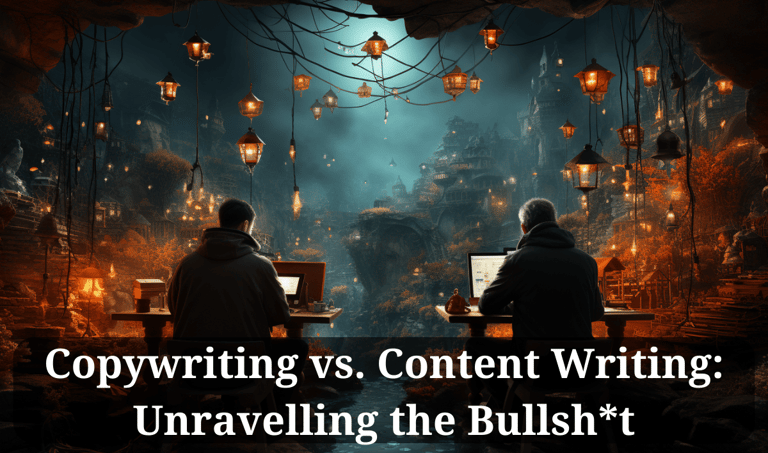Copywriting vs. Content Writing: Unravelling the Bullsh*t
Heaps of confusion surrounds copywriting vs. content writing. This article takes a nuanced approach, outlining differences and overlaps.
COPYWRITING


Two writing terms get mixed up more than gin and juice: copywriting vs. content writing. Although similar, there are key distinctions between them.
A nuanced understanding of the differences is critical for anyone pursuing a copywriting or content writing career.
Are you a business owner seeking writing services? You need a broader grasp to choose the best one for your needs.
This article will:
Cover the nuances of both forms
Offer a broader understanding of them
Outline the key elements of effective writing
Compare the financial aspect of each profession
Show business owners how to decide between the two
Let’s dive into the mix and unravel copywriting and content writing.
Understanding Content Writing
Content writers create informative, engaging, and valuable written content for various digital mediums. From blog articles to social media posts, content writers attract and engage your online audience.


A versatile skillset is key for content writers. You must write a wide range of content: blog articles, product descriptions, social media updates, and more.
Adapting your writing style to suit different platforms and target audiences is your bread and butter.
Whether crafting a compelling narrative for a blog post or creating concise and engaging social media posts, you have a knack for captivating readers with words.
Exploring the Definition and Scope of Content Writing
Content writing goes beyond throwing together words on a page. It involves research, analysis, and creativity.
You should do extensive research to ensure accuracy and relevancy before typing anything. Dig deep into sources, gather information, and synthesise it into an engaging piece that gives your readers value.
Use at least 50% of your time for research.
The best content writers stay on top of the latest trends and industry developments. Seek new knowledge and insights to provide readers with fresh and relevant content. It helps you to offer valuable perspectives and engage your readers.
Content Writing and Copywriting: Simplistic Distinctions
While content writing and copywriting are similar, they serve different purposes in marketing.
Copywriting aims to persuade and sell.
You can use it in advertising, marketing, and sales materials.
Sales pages
Website copy
Advertisements
Email campaigns
Copywriters use psychological hacks to persuade readers to act. With copy, you want to convince readers to click your call to action (CTA) to buy your product or download a resource.
Find out more in our complete copywriting guide.
Content writing educates and engages readers.
Your primary goal with content is to provide valuable information that informs and entertains your audience.
Content writers strive to build trust with readers, offering well-researched and accurate content. You create a connection with your audience and foster trust through content marketing.
Customer case studies
Social media posts
Blog articles
eBooks
The image below gives you a simplistic analogy for the differences.


Content Writing and Copywriting: Overlapping Artforms
If only the differences between content writing and copywriting were that simple. But that’s not the world we live in.
These forms of writing often overlap.
Copywriting can educate your reader about a service.
Take the copy on your website service page as an example. This is a copywriter’s lane.
But the copy might need to:
Educate readers on what your service offers
Tell them why they should trust you
Inform them about how it helps
Show them what to do next
So your service page can be educational. But it’s still copywriting - you want to persuade readers to use your services.
Content writing often persuades readers to take action.
For instance, you write an educational social media post. This is generally content writing.
But it might have a CTA to:
Persuade readers to subscribe to your newsletter
Convince them to visit your website
Ask them to repost content
Urge them to follow
So a social media post can also be persuasive. But it’s still content writing - you want to educate readers about your industry.
Copywriting and content writing often overlap. One element they must have in common is effectiveness.
The Key Elements of Effective Writing


Effective writing goes beyond slapping words on a page and hoping for the best. It involves writing engaging and compelling words to captivate readers and address their needs.
The following elements are essential for effective writing.
Engaging and compelling content
You need to craft engaging and compelling content to write effectively. The content should hook the reader and hold their attention until the end.
You can use:
Captivating headlines
Artful storytelling
Unique insights
Questions
Appealing to the emotions and interests of the audience creates a connection. It keeps readers coming back for more.
Addressing audience needs
Effective writing is impossible if you don’t know your audience. Whether you’re writing copy or content, you must know who you’re writing for.
What do they want to gain from your work?
Content writers must address needs, interests, and pain points by providing valuable and relevant information.
Copywriters must understand the motivations and desires of their target market to persuade them to act.
Meeting readers’ needs helps you to establish a connection and build trust. It makes your writing more powerful.
Optimising for search engines
Search engine optimisation (SEO) is part and parcel of content writing. You should optimise your content to increase organic visibility on search engines.
This involves doing keyword research and understanding search intent. You need to strategically include keywords and phrases in your content without sacrificing readability.
You should optimise your copy for search engines as well. The right audience can find it at the right time, leading to better conversion rates.
Optimising content and copy for search engines helps it reach a wider audience. You can drive higher traffic to your website and get your products in front of more people.
But it’s crucial to note this:
Effective writing strikes a balance between optimisation for search engines and people. Never write SEO content or copy that sacrifices the user experience.
High-quality SEO writing always delivers value to readers before search engines.
The Financial Side: Copywriting vs. Content Writing


The earning potential in content writing and copywriting can vary. Copywriters often earn higher rates due to the persuasive nature of their work and its direct impact on sales and conversions.
Content writers can find a wide range of clients and projects. In my experience, they get a more consistent workflow and longer-term contracts.
Ultimately, the earning potential in both fields depends on factors such as experience, skill set, industry, and demand.
Here’s what the average copywriter in Australia makes:
Glassdoor: $72,000
Salary.com: $72,000
Seek: $70,000
Payscale: $62,000
Here’s what the average content writer in Australia makes:
Glassdoor: $70,000
Salary.com: $70,000
Seek: $65,000
Payscale: $56,000
I’ve written copy and content over the past 5 years. Those numbers seem about right.
Copywriting tends to pay more than content writing. But there’s more consistent work available for content writers.
And it’s easier to get long-term clients through content writing. I’ve written content for some clients for years.
But copywriting can be a lucrative career choice. Businesses need copywriters who write high-converting copy. And they’ll pay top dollar for that skillset.
Choosing Between a Content Writer and a Copywriter


Choosing between a content writer and a copywriter depends on your goals and objectives.
Hire a content writer if you want to:
Build your industry authority
Pump out valuable info
Engage your readers
Educate them
Content writers excel in creating blog articles, case studies, social media posts, and eBooks. These forms give value to your audience.
Hire a copywriter if you want to:
Convey product benefits
Generate quality leads
Boost conversions
Drive revenue
Copywriters create attention-grabbing headlines, interesting copy, and compelling calls to action (CTAs). They understand consumer psychology and know how to influence buying decisions - copywriters sell with the written word.
Conclusion
Successful writing requires skill, creativity, and a deep understanding of the target audience. Copywriters and content writers need to master effective writing.
You must craft engaging and compelling content. It’s about connecting with readers, holding their interest, and addressing their needs.
Writers should strive for that as a bare minimum. Business owners should only hire writers who meet that threshold.
Writers who rise above earn the big bucks - and they’re worth every cent.
Need an expert writer?
Maybe you want to:
Convert website visitors at a higher clip.
Build your industry authority.
We can help.
Check out our copywriting and content writing services.
Not sure where to start? Book a no-obligation consultation.
